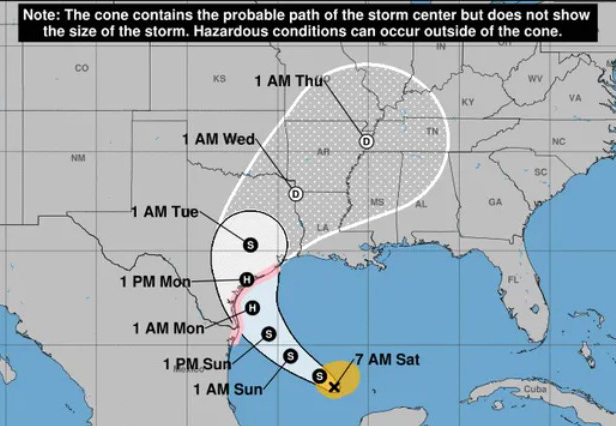 Acting Governor Dan Patrick today urged Texans to make final preparations and announced that he has added 81 counties to the state’s Hurricane Beryl Disaster Declaration as storm forecasts shifted the expected landfall north and east of previous projections. This brought the total number of Texas counties included in the state’s disaster declaration to 121 counties. Upon updating the disaster declaration this past weekend, Acting Governor Patrick issued the following statement:
Acting Governor Dan Patrick today urged Texans to make final preparations and announced that he has added 81 counties to the state’s Hurricane Beryl Disaster Declaration as storm forecasts shifted the expected landfall north and east of previous projections. This brought the total number of Texas counties included in the state’s disaster declaration to 121 counties. Upon updating the disaster declaration this past weekend, Acting Governor Patrick issued the following statement:
“As Hurricane Beryl approaches the Gulf Coast, today and tomorrow will be the last 2 days for Texans to make preparations for the coming storm. Beryl is a determined storm, and incoming winds and potential flooding will pose a serious threat to Texans who are in Beryl’s path at landfall and as it makes its way across the state for the following 24 hours.
Based on the forecast, heavy rain and some localized flooding was expected to occur all the way from the coast through areas near College Station, Tyler, and Texarkana as the storm moves through Texas on its current track. The track may change over the next 40 hours. Texans need to take heed, watch their local officials, and prepare today and tomorrow before the storm makes landfall early Monday morning.
“As Acting Governor, I’ve been in constant communication with Texas state agencies and local leaders to coordinate preparations and response, and I will continue to do so. Do not ignore this storm.”
The 81 Texas counties added include Anderson, Angelina, Austin, Bastrop, Bell, Bowie, Brazoria, Brazos, Burleson, Caldwell, Camp, Cass, Chambers, Cherokee, Collin, Colorado, Comal, Dallas, Delta, Ellis, Falls, Fannin, Fayette, Fort Bend, Franklin, Freestone, Galveston, Grayson, Gregg, Grimes, Guadalupe, Hardin, Harris, Harrison, Hays, Henderson, Hill, Hopkins, Houston, Hunt, Jasper, Jefferson, Kaufman, Lamar, Lee, Leon, Liberty, Limestone, Madison, Marion, McLennan, Milam, Montgomery, Morris, Nacogdoches, Navarro, Newton, Orange, Panola, Polk, Rains, Red River, Robertson, Rockwall, Rusk, Sabine, San Augustine, San Jacinto, Shelby, Smith, Titus, Travis, Trinity, Tyler, Upshur, Van Zandt, Walker, Waller, Washington, Williamson, and Wood counties. Additional counties may be added as conditions warrant.
According to the National Hurricane Center, Tropical Storm Beryl was expected to intensify as it moves northwest through the Gulf of Mexico, before it takes a northerly turn to make landfall along the mid-Texas coast as a hurricane on Monday. Interests in Texas should closely monitor this system and finalize preparations for hurricane impacts, including heavy rainfall, flooding, potential tornadoes, and damaging winds as the system moves inland across the state.
The Texas Division of Emergency Management (TDEM) increased the readiness level of the State Emergency Operations Center as of 10 a.m. Friday and Texas Emergency Management Council agencies are working 24-hour operations, while also continuing to preposition state emergency response resources that were readied for deployment by Governor Greg Abbott on Thursday.
The State of Texas currently has more than 2,000 responders and 850 assets rostered and deployed in support of the state’s response to anticipated impacts from Hurricane Beryl. The following state emergency response resources have been rostered and deployed to support response operations:
–Texas A&M Engineering Extension Service (Texas A&M Task Force 1 & Texas Task Force 2): Search and Rescue Personnel, and Swiftwater Boat Squads.
–Texas A&M Engineering Extension Service: Texas A&M Public Works Response Team.
–Texas A&M Forest Service: Texas Intrastate Fire Mutual Aid System (TIFMAS) All-Hazards Incident Strike Teams, including personnel and fire engines.
–Texas National Guard: National Guard Personnel, including High Profile Vehicles and Chinook & Black Hawk Helicopters.
–Texas Department of Public Safety: Texas Highway Patrol Troopers, the Tactical Marine Unit, and Helicopters with hoist capabilities.
–Texas Parks and Wildlife Department: Game Wardens and Park Police to provide law enforcement support, along with Swiftwater Boats, Airboats, Flat Bottom Boats, Four-wheel Drive Vehicles, and Helicopters.
–Texas Department of State Health Services (Emergency Medical Task Force): Medical Incident Support Teams and Severe Weather Packages, including Ambuses, Ambulances, and Command Vehicles.
–Texas Department of Transportation: Highway maintenance personnel and personnel to monitor roadway conditions.
–Texas Animal Health Commission: Personnel to provide livestock support.
–Texas A&M AgriLife Extension Service: Disaster Assessment and Recovery Agents as well as AgriLife Extension Agents to support agricultural and livestock needs.
–Texas Department of Information Resources: Monitoring for potential cyber-threats and impacts to technology infrastructure.
–Texas Commission on Environmental Quality: Air/water/wastewater monitoring
–Railroad Commission of Texas: Monitoring the state’s natural gas supply and communicating with the oil & gas industry.
–Public Utility Commission of Texas: Personnel to coordinate with utility providers across the threat area.
–Texas Voluntary Organizations Active in Disaster: Coordinating volunteer organizations across impacted areas.
–FEMA Region 6: More than 100 personnel, 500,000 Meals Ready to Eat, 800,000 liters of Water, 20,000 Tarps, 2,500 Rolls of Plastic Sheathing, Generators, Urban Search and Rescue Teams, Tractor-Trailers, Communications and Command Vehicles.
Texans were urged to stay informed, monitor local weather forecasts, follow directions from local officials, make an emergency plan, review hurricane evacuation routes, build a kit containing emergency supplies, and consider reviewing flood risk and insurance coverage.



